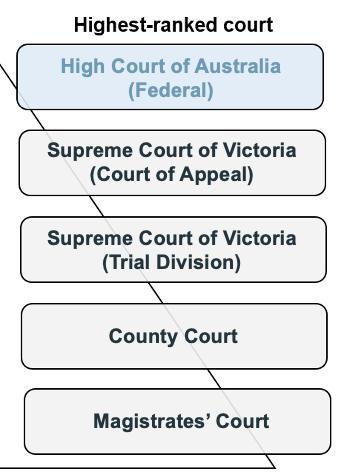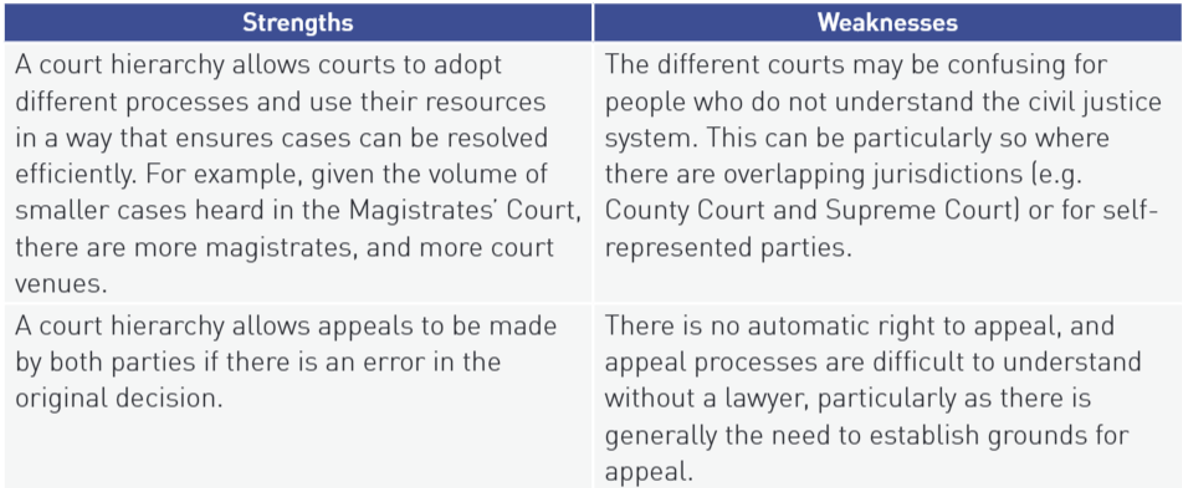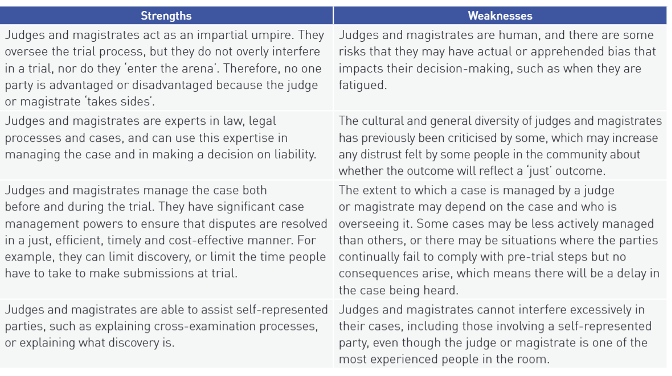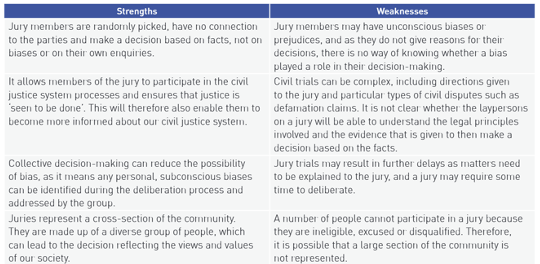SAC 2A
1/64
There's no tags or description
Looks like no tags are added yet.
Name | Mastery | Learn | Test | Matching | Spaced |
|---|
No study sessions yet.
65 Terms
parties in a civil case
plaintiff
defendant
civil dispute
a disagreement between two or more individuals in which one of the idnividuals make a legal claim against the other
liability
legal responsibility for one’s acts or omissions
remedy
an order made by the court designed to restore the plaintiff and address a civil wrong or breach by the defendant
key purposes of civil law
enable a person to enforce their legal rights to take action over legal wrongs
determine whether defendant has liability
award a remedy & compensate individuals for loss
burden of proof
plaintiff
standard of proof
on the balance of probabilities
more probably than not that the plaintiff’s claim is true
factors to consider before initiating a civil claim
costs
limitation of actions
enforcement issues
costs
fees for legal rep
disbursements
adverse cost orders
fees for legal representation
costs of engaging a solicitor or barrister - provide advice, draft court documents, advocate for client
how much they cost depends on
complexity of case
which dispute resolution body is used
size of the case
plaintiff must consider whether the cost will be more than the amount the plaintiff is seeking
disbursements
out of pocket expenses
filing fees - cost of initiating the action
hearing fees
jury fee
tribunal fees
mediation fees
fees for expert witnesses
adverse cost orders
if plaintiff is unsuccessful in a claim, they will not only pay for their own legal costs, but may be ordered to pay for some of the defendant’s costs
risk/fear of having adverse costs order could deter a plaintiff from initiating a claim
limitation of actions
restriction placed on the time within which a civil action can be commenced
once that time has passed, plaintiff may be ‘time-barred’ from seeking remedy
defendant does not have to face an action after a significant amount of time
evidence is not lost
disputes can be resolved as quickly as possible
enforcement issues
plaintiff must consider whether defendant is able to pay a court ordered remedy or out-of-court settlement reached and whether they will pay
defendant may be bankrupt or experiencing financial hardship and be unable to pay
defendant may be in jail
adefendant may be overseas or uncontactable
if defendant is a company, whether company has any assets
if defendant has no assets or money, whether they can access money (loans)
mediation
a method of dispute resolution that uses an independent third party to help the disputing parties reach their own resolution
role of mediator is to facilitate discussion between parties and encourage them to reach their own agreement
if parties come to a decision, they may sign a terms of settlement
conciliation
a method of dispute resolution that uses an independent third party to help the disputing parties reach their own resolution
conciliator generally has specialist knowledge, can offer suggestions
parties may sign a terms of settlement
disputes suitable for mediation and conciliation
parties wish to preserve the relationship after the dispute is resolved
parties are prepared and willing to compromise
parties seek privacy in resolving the dispute
parties wish to avoid costs associate with a court hearing/trial
parties wish to remove formalities of court
disputes not suitable for mediation and conciliation
one or both parties not willing to work together
imbalance of powerr between parties
dispute involves overly complex or technical legal matters
parties are too emotional about the dispute
matter is urgent and requires swift intervention
strengths of mediation and conciliation
involve an independent, impartial third party who assists parties to reach a resolution themselves
less formal than court
conducted in a safe and supportive environment
save time waiting for a final hearing/trial
normally conducted in private
weaknesses of mediation and conciliation
decision reached may not be enforceable
one party may compromise too much or may be manipulated
one party may refuse to attend - waste of time & money
if matter doesnt resolve, may be waste of time and money
no open justice for community
arbitration
a method of dispute resolution, where an independent third party (i.e., arbitrator) is appointed to listen to both sides of a dispute and make a decision that is legally binding on the parties.
the arbitrator makes a final and binding decision - arbitral award
parties can control process and evidence procedures
Magistrates’ Court (less than $10000), can refer a dispute to arbitration by a magistrate
disputes suitable for arbitration
parties have agreed to arbitrate
plaintiff is seeking $10,000 or less, claim is filed in Magistrates Court, court will normally refer the case to arbitration
parties are seeking a binding and enforceable arbitral award
parties want evidence presented to a third party - subject to rules of evidence
parties want dispute resolved privately & confidentially
disputes not suitable for arbitration
parties are not willing to arbitrate the dispute
parties would prefer to have control over outcome
plaintiff wants a public record of what occurred
strengths of arbitration
decision is binding and is fully enforceable
held in private
parties have control over how the arbitration is conducted
generally an expert on subject matter
weaknesses of arbitration
no control over outcome
not available if parties have not agreed
costly & time consuming
can be formal
court hierarchy

reasons for court hierarchy
appeals
administrative convenience
court hierarchy: appeals
without a ranking of courts, there would be no process to appeal a case to higher, which would create unfairness if court incorrectly decided a civil dispute
grounds for appeal
appealing because of remedy
appealing on a question of fact
appealing on a question of law
leave for appeal
need the court’s permission to have your appeal heard
if you are not given leave to appeal your case will be dismissed
reasons for court hierarchy: administrative convenience
ranking of courts in a vertical hierarchy allows cases to be distributed based on their seriousness and complexity.

administrative convenience: magistrates’ court
less serious and complex (plaintiff seeking less than $100,000)
cases are heard more quickly & lower cost
do not require complicated forms or physical facilities
filing & hearing fees are lower
more magistrates and locations
allows for better allocation of resources
administrative convenience: county & supreme court
•handle more serious and complex civil disputes, with both courts having unlimited jurisdiction.
•take longer to hear civil matters due to their complexity, and these courts can devote greater time and resources to resolve the matter.
•The hierarchical structure allows them to easily manage the allocation of time for longer, more complicated cases.
court hierarchy strengths & weaknesses

roles of the judge/magi
act impartially
case management (before)
case management (during)
determine liability & remedy
decide on costs
judge/magi: act impartially
no bias toward or against plaintiff or defendant (in deciding liability & exercising powers)
no apprehended bias (perception that judge is partial)
independent of government or parliament
no connection to parties or case
judge/magi: case management (before trial or hearing)
Civil Procedures Act 2010 (Vic)
judges/magis can make any order or direction they believe will help create a just, efficient, timely and cost-effective resolution of a civil dispute
eg.
order parties to attend mediation (s.66)
fixing timetables - imposing deadlines on the parties
during discovery (where parties exchange relevant documents) - limit discovery to certain categories of documents
judge/magi: case management (during trial or hearing)
limiting the time for hearing/trial
restricting examination of witnesses
limiting number of witnesses
restricting number of documents used as evidence
judge/magi: determine liability & remedy
magistrates
will decide whether plaintiff has established their case of balance of probabilities
also determines an appropriate remedy
judges
(if no jury) decides liability on the balance of probabilities
(if no jury) determines remedy
judge/magi: decide on costs
judge or magistrate will decide which party should bear the costs - can issue adverse cost order
generally, successful party is entitled to costs
strengths & weaknesses of judge/magi

roles of the jury
be objective
listen to and remember evidence
understand directions and summing up
decide on liability (sometimes damages)
jury - be objective
must be unbiased and put prejudice aside
jury members have no connection to parties
must decide liability on BOP based on fact, not bias
jury - objectively listen to and assess the evidence
jury members must collate and make sense of evidence
can often be difficult for ordinary laypeople to understand
jury must not undertaken personal research
jury - understand directions and summing up
trial judge will give directions to jury
jury members must listen to directions & summing up
can ask for explanation on legal point they don’t understand
jury - participate in deliberations to reach a verdict
jury will enagge in deliberations to form an opinion on who they believe
civil jury must try to get unanimous verdict, but court can accept majority
confidential
act to challenge each other to ensure no bias
jury - decide on damages
jury will assess the amount of damages to award the plaintiff (if defendant is liable)
in defamation cases - jury cannot decide on damages as reputational harm is too difficult to quantify
strengths & weaknesses of jury
